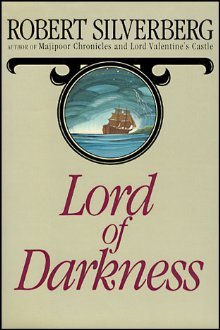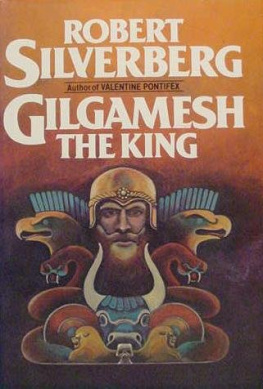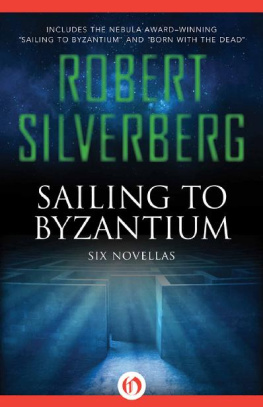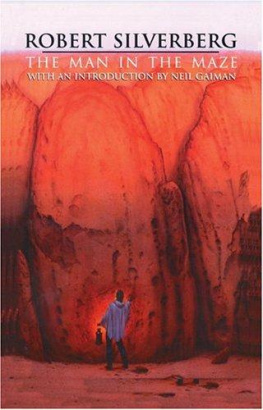Robert Silverberg - The Red Blaze is the Morning
Here you can read online Robert Silverberg - The Red Blaze is the Morning full text of the book (entire story) in english for free. Download pdf and epub, get meaning, cover and reviews about this ebook. year: 2014, publisher: Subterranean Press, genre: Science fiction. Description of the work, (preface) as well as reviews are available. Best literature library LitArk.com created for fans of good reading and offers a wide selection of genres:
Romance novel
Science fiction
Adventure
Detective
Science
History
Home and family
Prose
Art
Politics
Computer
Non-fiction
Religion
Business
Children
Humor
Choose a favorite category and find really read worthwhile books. Enjoy immersion in the world of imagination, feel the emotions of the characters or learn something new for yourself, make an fascinating discovery.
- Book:The Red Blaze is the Morning
- Author:
- Publisher:Subterranean Press
- Genre:
- Year:2014
- ISBN:978-1-59606-705-9
- Rating:3 / 5
- Favourites:Add to favourites
- Your mark:
- 60
- 1
- 2
- 3
- 4
- 5
The Red Blaze is the Morning: summary, description and annotation
We offer to read an annotation, description, summary or preface (depends on what the author of the book "The Red Blaze is the Morning" wrote himself). If you haven't found the necessary information about the book — write in the comments, we will try to find it.
The Red Blaze is the Morning — read online for free the complete book (whole text) full work
Below is the text of the book, divided by pages. System saving the place of the last page read, allows you to conveniently read the book "The Red Blaze is the Morning" online for free, without having to search again every time where you left off. Put a bookmark, and you can go to the page where you finished reading at any time.
Font size:
Interval:
Bookmark:
The Red Blaze is the Morning
by Robert Silverberg
The RedBlazeis the Morning
The Violetis Noon
The YellowDayis falling
And after thatis none
Day by blazing day Halvorsen stretches himself across a blistering abyss, patiently searching in recalcitrant rock and hot sand for morsels of the useless past, even though he has begun to doubt the meaning and value of his own work. By chilly night, soaking his damaged and aching leg in a shallow basin of tepid sea-waterin this arid part of Turkey, fresh water is a luxuryhe feels seductive fingers tickling the membranes of his mind. Something is trying to get in: perhaps already has. Something keeps nestling down alongside his consciousness and whispering fantastic, tempting things to him, visions of far-off times, mighty civilizations yet unborn. Or so it often seems.
What is actually going on, Halvorsen suspects, is that he is beginning to go crazy. The fascination of whats difficult, he thinks, has not merely dried the sap out of his veins, as old Yeats feared it would, but has parched his brain beyond the bounds of sanity. And yet he can still speak six languages, including Turkish and Hebrew and modern Greek, and he can read Latin and classical Greek besides. He can recite the names of the Roman emperors from Augustus to Romulus Augustulus without missing one. Yes, his mind still functions well enough. Something else, something equally intangible and even harder to define, is what has become impaired. And then there is the sore leg, too, which mended inadequately after last summers accident on the rocky slope and is painful all the time. The leg is really in very bad shape. He ought not to be out here on the summit of the hill with a pick and shovel. He should be sitting in his tent, supervising the work of others. But Halvorsen has always been a hands-on kind of archaeologist: a point of great pride for him.
This is the fifth week of the third season of the dig. It is high summer, when the blue cloudless sky reflects the light of the swollen sun like a hot metal plate, and the meltem, the dry, hot, unrelenting wind out of the inland plateau, sends 50-mile-an-hour blasts of brown dust into your nostrils and eyes and mouth and every cranny of your clothing for four or five days without halting. Halvorsens site is on a ragged little peninsula in southwest Turkey, overlooking the Mediterranean coast. It is an unimportant place that does not even have a paved road running to it, nor running water or electricity, and yet it has a long history. There is a tiny fishing village here now; before that, there was a Byzantine naval base; before that, Romans; before them, a Greek trading outpost; before that, a Minoan trading outpost; before that, Halvorsen thinks, a proto-Hittite encampment. And before thatah, nobody knows what was here before that. But Halvorsen has a hypothesis, based on a few scattered and questionable bits of evidence. For three summers, now, he has been trying to find more satisfactory proof to support that hypothesis.
At mid-morning on this blazingly hot day Halvorsen is working alone on high, extending the trench that runs along the proto-Hittite side of the hill. Nobody he knows believes that the Hittites ever lived here, or anywhere else along this coast; and he himself has nothing to go by in that direction except the presence at the highest point of the site of a double line of mud-brick walls, two courses high, that feel more or less Hittite to him. But he is not particularly concerned with the Hittites, anyway: they are a Bronze Age folk, and he is looking for something much more ancient. Still, it would be helpful to prove that the Hittites had passed this way too. And this is his dig. He can call this wall proto-Hittite if he feels like it, at least for the time being.
The site where he is working is a difficult one, steep and precarious. A rainstorm of unprecedented ferocity for this dry coast, six winters back, had carved away half the western face of the hill, laying bare the very finds that had brought Halvorsen here in the first place; but the angle of the lie is practically vertical, the soil crumbles easily, and Halvorsens budget will not allow him to put proper bridging across the worst of the gaps. So he hobbles around up here, walking lopsided as it is because of his torn-up leg, testing the ground as he goes in order to make sure it will bear his weight, and fearing at every moment that he will hit a weak spot and go tumbling down in a black cloud to land on the fanged rocks below.
He knows that he ought to be letting his Turks extend this trench for him. But he feels that he is on the brink of a major discovery. How would the workmen be able to detect the place where the terrain changes, and the proto-Hittite stratum gives way to an even older one?
Theyll know, Jane Sparmann says. Shes the graduate student from Columbia who has been working with him out here for three years, now. They may be illiterate laborers, but theyve spent their whole lives digging in these mounds and they have a sixth sense about any kind of shift in the matrix.
Even so, Halverson has replied whenever this comes up. I want to do this myself. I have a seventh sense.
Sparmann laughs. Halvorsen knows that she thinks he is stubborn to the point of irrationality. Very likely Sparmann believes that too many summers under the Mediterranean sun have addled his brain, grand old figure of the field that he is. Well, so be it: shes probably right. But he intends to do his own digging up here, even so. Moving slowly along the stone base of the mud wall, looking for the precise spot at the end of the proto-Hittite wall where the soil darkens into virginity and then the place just beyond it where, he hopes, the Neolithic occupants of this site had erected their primordial acropolis.
Its a fine place for an acropolis. No enemies can come upon you unaware, if you have watchmen posted up here. The hill runs athwart the peninsula for five hundred meters, a sharp rocky ridge. Look to the west and you see the smooth blue sea. To the east, you have a long view of the baking dusty plain.
Halvorsen pokes with his pick, scrapes, peers, brushes the dirt aside, pokes again. Nothing. Its dull work, but hes used to it. Steady toil, unrelieved boredom, sweat and dust, one clump of dirt and rock after another, poke and sift, move along. He thinks enviously of Schliemann unearthing rooms of golden treasure, Howard Carter shining his flashlight beam into the tomb of Tut-ankh-Amen. But of course they had put in their months and years of dusty boredom too.
Mudur Bey! calls a loud rasping voice from below. Mudur Bey! His title: Mr. Director. The Turks cant or wont learn to pronounce his name. With difficulty Halvorsen levers himself upright, leaning on his shovel, and peers down the eastern slope of the hill to the place where Sparmann and three of the diggers are working, over at the edge of the Greek settlement. Ibrahim, his foreman, is standing in the trench, triumphantly holding up a crude buff-colored pot.
What is it? Halvorsen asks.
Jane Sparmann, at Ibrahims elbow, cups her hand and calls, Its full of coins! Athenian owls, some Corinthians, something from Syracuse.
Fine, Halvorsen says, without enthusiasm. Give him his bonus.
You dont want to see them?
Later, he says.
They always pay the diggers extra for any easily marketable artifacts, to keep them from taking them on their own behalf. The expense is trivial, a hundred liras per coin. Sparmann is excited by the findshes still youngbut to Halvorsen the coins, and indeed the whole Greek settlement, are merely an irritating distraction. Dozens of Greek coins turn up wherever you put a spade in the ground. As for the stumps of a little temple, the hazy outlines of a marketplace: who cares? The Mediterranean world is full of Greek temples. They bring no news. Halvorsen is looking beneath such things, beyond, behind, searching for the secret from which all this Mediterranean splendor sprang. The unknown progenitor-race, the pivot, the fulcrum on which the magnificence turned as it began the centrifugal outreach of its grandeur.
Font size:
Interval:
Bookmark:
Similar books «The Red Blaze is the Morning»
Look at similar books to The Red Blaze is the Morning. We have selected literature similar in name and meaning in the hope of providing readers with more options to find new, interesting, not yet read works.
Discussion, reviews of the book The Red Blaze is the Morning and just readers' own opinions. Leave your comments, write what you think about the work, its meaning or the main characters. Specify what exactly you liked and what you didn't like, and why you think so.


















